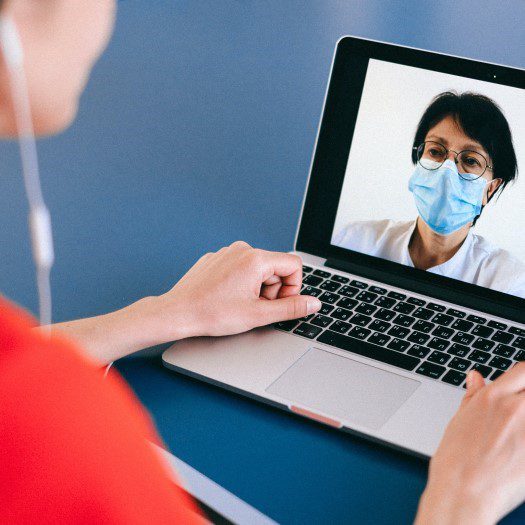By Enise Kaya Urcan, MPharm, MS Candidate in Human Nutrition
According to the Academy of Nutrition and Dietetics, telehealth is defined as the use of electronic communication to support long-distance health care, health education, and administration. Telehealth allows clients to access and communicate with healthcare providers at their convenience. Thanks to technological advancements, the help and support clients need are only a few fingertips away.
Benefits of Nutrition Services via Telehealth
One of the most used telehealth services is Medical Nutrition Therapy (MNT) (Ellis, 2021). MNT includes several steps, including diagnosis, therapy, and counseling to manage a chronic disease nutritionally. A licensed dietitian delivers nutrition assessments via interactive audio and video telecommunications to clients in real-time. Any communication without visuals (e.g., telephone calls) does not qualify as a telehealth service (“Medicare Telehealth Services and Registered Dietitians,” 2021). Therefore, virtual communication requires certain tools such as a computer or a phone with a camera and internet access, and the client needs to be comfortable using this technology (Chen et al., 2018).
How does it work?
A registered dietitian will interview the client to obtain the necessary health and nutrition intake history during the first assessment. After the initial evaluation, the dietitian may ask for authorization to access the client’s medical health record (“Individuals’ Right under HIPAA to Access their Health Information,” 2021). In follow-up appointments, setting small, manageable goals so the dietitian can monitor progress. Although some of the in-person services will be missing during the virtual appointments, such as getting vitals and lab results, dietitians can still collect valid measurements through the client’s health record(s).
Will insurance cover the telehealth services?
Insurance coverage and reimbursement for MNT vary significantly in each state. Since federal laws do not include telehealth services for Medicaid coverage, specific regulations affect state-level policies and differ considerably. State Medicaid programs may limit the type of facilities, so it is essential to check the available options before planning telehealth services. The Medicare Part B program covers individual and group nutrition therapy sessions, behavioral counseling for obesity and eating disorders, annual wellness visits, and diabetes self-management training (“State Telehealth Policies,” 2021). Before delivering a telehealth service, registered dietitians should also confirm the individual health plan benefits to ensure coverage policies. For more information, visit ncsl.org.
The HIPAA Privacy Regulations
Another important detail you need to be familiar with is the HIPAA privacy regulations. Under the HIPAA regulations, before the treatment starts, the practice should distribute a privacy notice to all clients. It is a good practice to allow clients to access their progress records. Therefore, clients can ask to obtain their health records. Please note that the practice may charge an extra fee to release records. The HIPAA security rule sets national standards for electronically protected health information. The practices should take necessary precautions to prevent data security breaches (“HIPAA Guidelines on Telemedicine”, 2021).
References:
Chen, J., Gemming, L., Hanning, R., & Allman-Farinelli, M. (2018). Smartphone apps and the nutrition care process: Current perspectives and future considerations. Patient Education And Counseling, 101(4), 750-757. doi: 10.1016/j.pec.2017.11.011
Ellis, E. (2021). How an RDN Can Help with Diabetes. Eatright.org. Retrieved 16 October 2021, from https://www.eatright.org/health/diseases-and-conditions/diabetes/how-an-rdn-can-help-with-diabetes.
HIPAA Guidelines on Telemedicine. (2021). Retrieved 16 October 2021, from https://www.hipaajournal.com/hipaa-guidelines-on-telemedicine/
Individuals’ Right under HIPAA to Access their Health Information. (2021). Retrieved 16 October 2021, from https://www.hhs.gov/hipaa/for-professionals/index/html
Medicare Telehealth Services and Registered Dietitians. (2021). Retrieved 16 October 2021, from https://www.eatrightpro.org/practice/practice-resources/telehealth/medicare-telehealth-services-and-registered-dietitians
State Telehealth Policies. (2021). Retrieved 16 October 2021, from https://www.ncsl.org/research/health/state-coverage-for-telehealth-services.aspx
Shvets, A. (2021). Telehealth [Image]. Retrieved 16 October 2021, from Pexels













